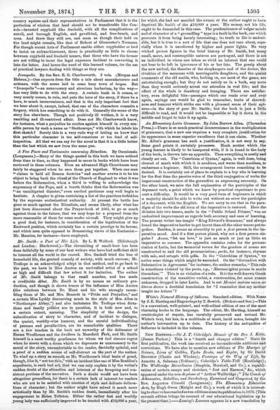Mr. Smith,: a Part of .His Life. By L. B.
Walford. (Edinburgh and London : Blackwood.)—The chronicling of small-beer has been done faithfully by some of our best writers who have had sufficient skill to interest all the world in the record. Mrs. Gaskell tried the line of household life, the genteel comedy of society, with much success; Mr. Trollope is an acknowledged adept in that method, and to go back to the past, we have in Miss Austen an unrivalled artist of a school so high and difficult that few select it for imitation. The author of Hr. Smith belongs to that small number, and has made a creditable debut. Mr. Smith is by no means an ordinary pro- duction, and though it shows traces of the influence of Miss Austen (the relations between Dr. Hunt and his wife strongly resem- bling those of Mr. and Mrs. Bennett in "Pride and Prejudice," and a certain Miss Lyddy discoursing much in the style of Mrs. Allen in "Northanger Abbey,") and also imitatates Mr. Trollope when flirta- tions and family politics are in question, it is both new and, to a certain extent, amusing. The simplicity of the design, the subordination of story to character, and of incident to dialogue, the quaint, worldly-wise humour, and the careful individualising of persons and peculiarities, are its remarkable qualities. There are a few touches in the book not unworthy of the delineator of Emma Woodhouse and the dwellers in Mansfield Perk, and Mr. Smith himself is a most worthy gentleman for whom vra feel sincere regret when he meets with a doom which we deprecate als unnecessary to the moral of the story, uncomfortable to the reader, decidedly spiteful, and a proof of a sudden access of self-distrust on the part of the author. To wind up a story as smooth as Mr. Woodhouse's ideal basin of gruel, though, like it," not too thin," with an incident like one of Miss Braddon's expedients, is such bad art, that we can only explain it by the writer's sudden doubt of the attraction and interest of the foregoing and con- sistent portions of the narrative. Such a doubt would not have been altogether groundless, for there is a certain lack of interest for readers who are not to be satisfied with niceties of style and delicate delinea- tions of character ; but the author might have solved it much more artistically than by Mr. Smith's sudden death, immediately after his engagement to Helen Tolleton. Either the rather fast and worldly young lady was sufficiently improved to be trusted with .610,000 a year, for which she had not married the Owner, or the author ought to have deprived Mr. Smith of the £10,000 a year. His money, not his life, ought to be demanded in this case. The predominance of vulgar minds and of character of a " gronndling " type is a fault in the book, one which prevents it from being keenly interesting; its truth to life is undeni- able, but it is true to a sort of life that one does not care about, espe- cially when it is unrelieved by higher and purer lights. No very wicked person figures in the brief history of Mr. Smith, but many small, mean, and contemptible natures are portrayed, and there is not an individual in whom one takes so vivid an interest that one could not bear to be left in ignorance of his or her fate. The gossip about the new arrival, the theories of the shopkeepers and of the doctor, the rivalries of the mammas with marriageable daughters, and the quaint comments of the old maids, who, looking on, see most of the game, are entertaining enough ; but they do not satisfy us in a book, any more than they would seriously arrest our attention in real life ; and the effect of the whole is desultory and lounging. There are satisfac- tory, even delightful bits—passages which one reads over and over again, sayings one would be glad to remember, traits of shrewd- ness and humour which strike one with a pleasant sense of their apt- ness—in the story of poor Mr. Smith; but the book is just a little
difficult to read, and it would not be impossible to it down in the middle and forget to tako it up again.






































 Previous page
Previous page